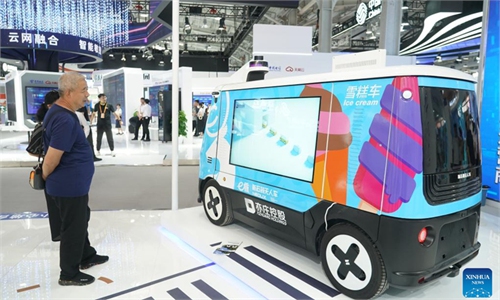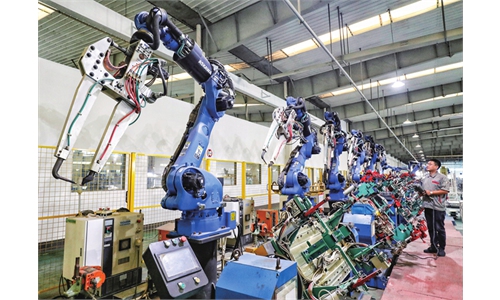
Visitors experience the green environment of the Xiong'an New Area through a simulated ride on September 7, 2023 at China International Digital Economy Expo 2023 in Shijiazhuang, North China's Hebei Province. Photo: cnsphoto
Overseas-funded companies are showing their rising interest in China's digital transformation, and are exploring further opportunities in the Chinese market, as the country's policymakers focused on the nation's high-quality development.
"China not only has a big market, and it has its advantages in cloud computing, AI and 5G, and we will leverage our technological and strategic advantages to participate in the digital transformation of China's industries," Peter Weckesser, Chief Digital Officer of Schneider Electric told the Global Times, explaining that digitalization, and green low-carbon industries have become important development sectors which have provided new opportunities for the company as China's economy is shifting from high-speed growth to high-quality development.
It is Weckesser's second visit to China since he joined Schneider Electric. In his eyes, China is a vast market with favorable conditions for both local companies and multinational giants.
China is Schneider Electric's second largest market in the world, and is home to one of its four major R&D bases, and its most important supply chain base. It has 29 factories and logistics centers across China, with a business footprint covering more than 300 cities since it established business in China 36 years ago.
"As a technology-oriented company, we need to get closer to our industry partners, and China is the right place to find these partners, enabling us to better understand digital transformation," he said.
"As we all know, we have always been optimistic about China's development. With the help of its "China Hub" strategy, we will explore the application of emerging technologies such as 5G and AI, and continue to increase investment and enhance comprehensive strength including innovation and supply chains, he added.
Weckeser's remarks are echoed by Stephan Timmermann, CEO of KSB Group, a Germany-based company which mainly produces pumps and valves.
Timmermann recently made his first visit to China after a four-year hiatus due to the pandemic. He expressed optimism over the Chinese economy and the company's determination to continue to increase its investment in China.
The company set up factory in China in 1994. In June of this year, KSB set up a joint venture with Shanghai Electric Group, transferring all nuclear pump valve technology to local Chinese operators, which greatly accelerates the importance of nuclear main pump technology and boosts the level of nuclear power construction manufacturing in the country, according to KSB.
Currently, China only accounts for one tenth of KSB's global market share.
Regarding digitization, the company said it is propelling the development of smart manufacturing by establishing digital factories and digital services, further driving the company's digital transformation.
China is one of the most important markets that we have. It is exciting to see our factory has realized digital production, and digitalization brings us an increase in value, and we see this trend continuing, Timmermann said.
China is also increasing the integration of the digital and real economy. In 2022, China's digital economy had reached 50.2 trillion yuan ($6.99 trillion) in size, up from 11 trillion yuan in 2012. The digital economy accounts for more than 40 percent of the country's GDP.
Experts said that digitalization has become a key driving force for the development of the real economy, as Chinese government is takings measures to integrate digitalization and the real economy.
Global Times



